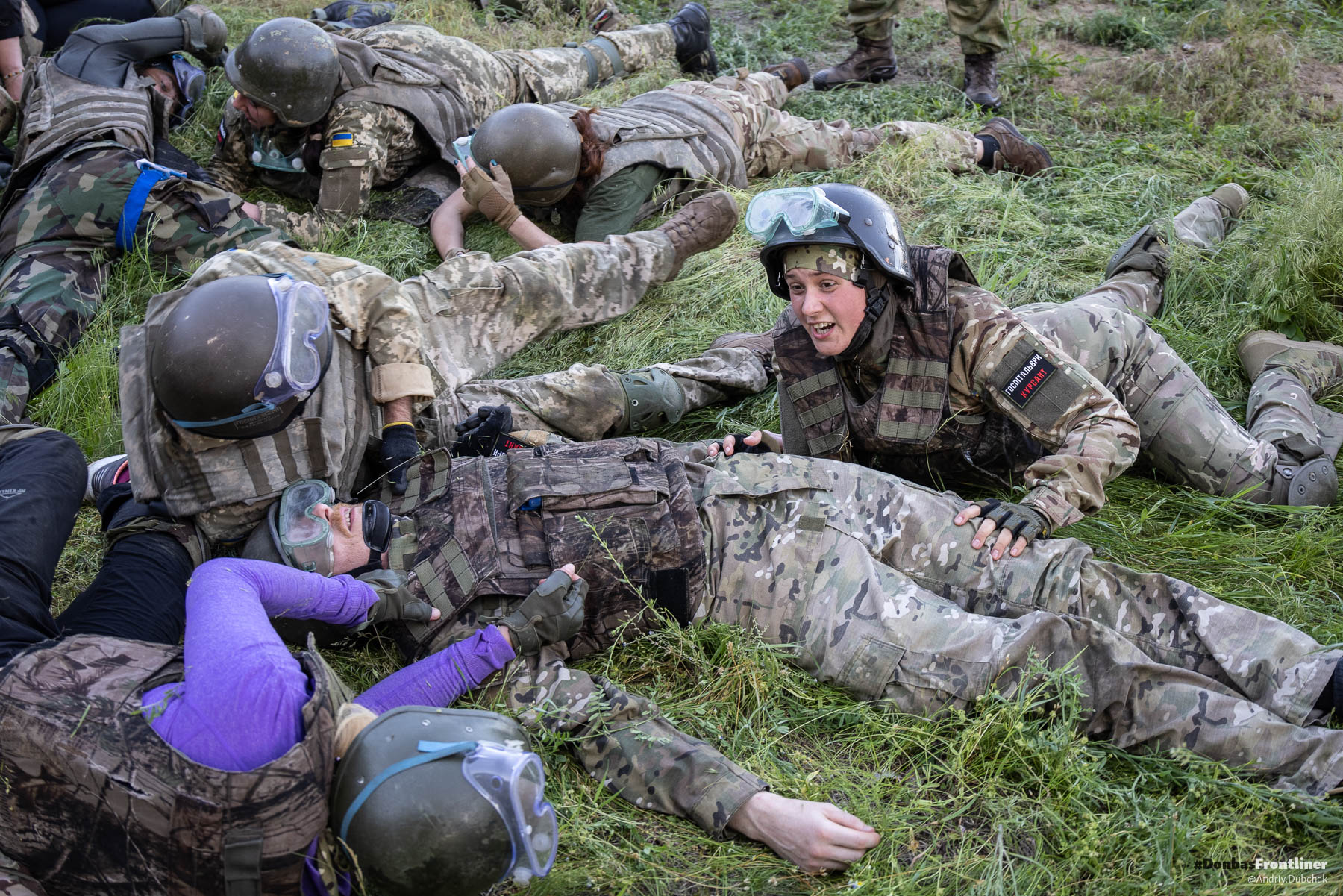Donbas Frontliner spent some time with the Ukrainian medical battalion Hospitaliery, interviewing their young leader Yana Zinkevych, the instructors, assistants and the trainees. All the protagonists agree that it’s a tough school, but highly necessary in times of war.
Donbas Frontliner, an independent interactive media project launched by three Ukrainian journalists - Olena Maksymenko, Eva Fomycheva, Andriy Dubchak - publishes frequent reports and on-site photos of life in the trenches, covering both the military conflict and the hybrid war launched by Russia against Ukraine. Frontliner reporters and their crew are physically present on the front lines 24 hours a day seven days a week.
Donbas Frontliner brings us this live report from eastern Ukraine.

Arrival
The first lessons proceed with difficulty - both emotionally and physically. Seventeen trainees are divided into three groups - “Alpha”, “Bravo” and “Charlie” - in a manner similar to that of the US army.
They try on bulletproof vests, helmets and protective glasses. Some do so as if it were routine, while others are less sure of themselves. Some are dressed in camouflage, while others are in sportswear. Each of them receives a chevron embossed with the words “Hospitaliery Cadet”.
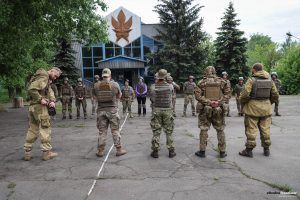
Men and women of varying ages, education, physical fitness, worldviews and experience have arrived at the village of Dmytrivka in Dnipropetrovsk Oblast to learn and hone their life-saving skills.
“We do not administer treatment – our mission is to save lives!” the instructors underline.
The small buildings once housed a children’s summer camp. Small beds with spring mattresses, “plaques of honour” and other attributes remind us of the past days.
Here, instead of children’s songs and campfires, grenades and detonators explode and trenches are dug on the football pitch.
The base now hosts training exercises for the Hospitaliery. For these newly-minted cadets, the next week is going be one long tough ride - albeit unforgettable - in more ways than one.
Knights in shining armor, of sorts
The volunteer medical battalion Hospitaliery was founded in 2014 as part of Pravy Sektor, which has been part of the Ukrainian Volunteer Army since 2015. Volunteer medics later founded the municipal enterprise Dnipro Hospitalery.
When the war began in 2014, Hospitaliery founder and leader Yana Zinkevych had only just finished school. Instead of continuing her studies at the medical institute, Zinkevych joined the Ukrainian Volunteer Corps. She was responsible for attending to and saving the wounded; in turn, she founded a medical service which has been one of the most effective of its kind on the frontline.
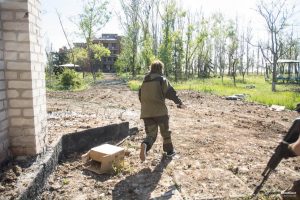
Yana was extremely fortunate to survive a serious car accident in 2015. She now uses a wheelchair, but her injury has not prevented her from remaining active. As she continues to manage the Hospitaliery unit, she also serves as Member of Parliament from the European Solidarity fraction and Secretary of the Healthcare Committee in the Verkhovna Rada. In addition, Yana continues her studies: she is enrolled at a medical institute, but took an academic leave after the second year; she is also completing a university degree in political science at another institution. She processes documents for war veterans who fought as volunteers and raises her daughter, Bohdana.
We meet with Yana near the Ukrainian Parliament. She arrives after the parliamentary session, while we have just returned from the Hospitaliery training base and are about to depart for another mission to eastern Ukraine. Yana tells us how they came up with the name of the battalion:
“After the assault and liberation of one village, the enemy began shelling us, so everyone took shelter in nearby basements. A small group of people, myself included, ran to hide in a small cellar. Among us was a priest. To take our minds off the shelling, he told us a story about the Knights Templars and the Knights Hospitallers. I’ll be honest, this was the first time I’d heard about them, but I began thinking that if we lived to see the next day - because the shelling was constant - I’d launch a medical unit and call it Hospitaliery”.
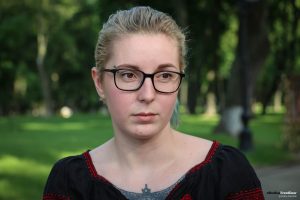
At that time, barely a handful of combat paramedics worked in the war zone. Yana’s first recruits consisted of people without any prior experience of medicine, aside from one recruit (a dentist). A medical doctor joined later. Since then, several teams have been trained, men and women who have saved over 2,000 lives over the years.
“I remember the 300th person that we saved. He would’ve probably survived without my intervention. We were liberating Karlivka. The first assault was unsuccessful, and it was at that time that a volunteer from our ranks was wounded. He was from Ivano-Frankivsk; his call sign was “Tykhenky” (the quiet one); he currently serves as an officer in the volunteer corps. He’d sustained a bullet wound in the knee. Back in those days, we had barely any medical supplies, but we made use of what we had. It’s at that moment that I knew I’d become a medic. After that, Dmytro Yarosh, our commanding officer, wanted to see me. He offered me his combat knife as a gift and told me that everything would work out for me”. recalls Yana.
Hospitaliery, Yana’s unit of paramedics was founded on July 6, 2014.
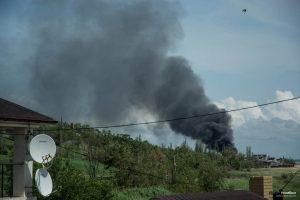
At that time, combatants and medics had neither the equipment nor a single protocol for administering first aid. Professional skills had to be acquired quickly, and the experiences of tactical medicine in other countries were taken into consideration. People of diverse backgrounds offered assistance to the Hospitaliery - from businessmen and politicians to shop vendors in eastern Ukraine who, when they began seeing the familiar cadet chevrons, brought water and food, saying: “We’ll help in any way we can!” Diaspora Ukrainians also offered help, including procurement of vehicles for the Hospitaliery. Zinkevych recalls the first training camps, which were organized in March 2015.
“Back then, we took our first steps, overcame our first trials. We saw how instructors of other organizations ran training session, including ‘Patriot Defence’, and… well, it’s great that they can travel and train combatants, but our problem is that we have no trained paramedics. All our paramedics were using different systems; there was no coordination. I understood that at least for myself and my trainees, and for the Pravy Sektor units, there was a great need for a unified training standard.
Then, volunteers began joining our ranks. They simply arrived in the anti-terrorist operations (ATO) zone in eastern Ukraine, as did combatants of other battalion units. Over time, the training camp grew to be very professional. Today, men and women who want to serve as paramedics in the Armed Forces of Ukraine will often take part in our training camps, and they can use our recommendations for further military service.”
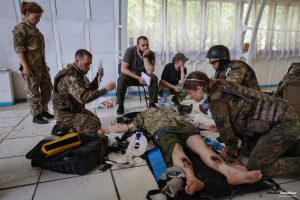
The Hospitaliery are present on all advanced positions, but they still do not have official combatant status as granted by Ukraine’s government. Hospitaliery volunteers work and cooperate with the brigades, so they can no longer report publicly about their activities in the “hot spots” of the war zone. This information policy threatens to diminish public support for the Hospitaliery… if no reports and photos are published on social media, their vivid narratives about saving lives will not be known to the vast majority of society. The funds raised to support the training sessions barely cover the expenses for supplies, material and the cantine.
The science of rescue
Training camps last one week. They include theoretical exercises and practical work, including, as they are referred to, combat simulations. These simulations play out combat situations, in which the newly arrived trainees must apply their knowledge in highly stressful and dangerous conditions. At the end of the week, the trainees are examined and receive a certificate. To date, nearly 2,000 volunteers have completed such week-long trainings.
The instructors explain that the certificate has no legal force, but it is used as a reference in different organizations.
Some of the trainees have come for a second time. Their first attempt to pass the exam was unsuccessful. There are also military servicemen, who will use this knowledge in active phases of war.
“I want to be able to provide medical care in civilian life and in instances of armed combat. I’m an electrical engineer by profession. I don’t have any experience in combat. I’m a little nervous.” says Dmytro, call sign “Miller”.
At the first assembly, the trainees are asked to think up call signs, which they will carry until the end of the training session. They sign up for various reasons…
“I want to learn how to save lives. I plan to sign a contract to work as a paramedic.” explains Nastya, call sign “Krokha” (Tiny).
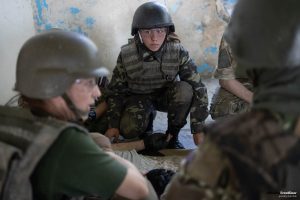
Tata and Valentyna, friends with the respective call-signs “June” and “Vuzlyk” (Knot) are already acquainted with administering medical care. Both are Red Cross volunteers. Valentyna is studying to be a medic and works as a nurse, while Tata was trained in tactical medicine in the NGO Ukrainian Legion.
“First and foremost, I want to improve my knowledge of tactical medicine, I’m from eastern Ukraine, so I’m very motivated. I intend to teach tactical medicine to combatants on the frontlines. I want to learn more practical skills; I want them to push me to the limit. I want to feel how it is to be in stressful situations so when it comes to the crunch, such situations won’t be a novelty to me.” Tata tells us.
At the time of the article’s publication, Tata had already left for the first front line rotation of the Hospitaliery.
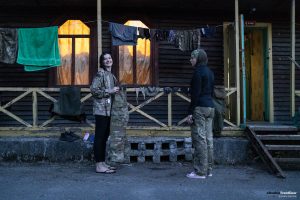
Oksana, call-sign “Kalyna”, is also familiar with medicine. She admits that she completed her medical studies a long time ago, in 1997.
“I hope to bring my knowledge up to speed, plus I’m specifically interested in tactical medicine. I want to find some friends, some like-minded persons here. In addition, I want to test my limits - how much I can endure, how much, let’s say, energy I’ll need to learn and bear the physical demands of training. My husband is a soldier; he’s a combat officer. I’m interested in the role of women in times of war. I’m a Zaporizhzhian Cossack; I’m studying the psychology of women in combat conditions and the history of Cossack women.”
Mykola, call sign “Pisnya” (Song) has lived in Mariupol for two years, and the city’s proximity to the battlefront has motivated him to learn about how to function in combat conditions.
“If something starts, I must be useful to society. And in the meantime, completing courses and providing first aid in combat conditions will definitely not be superfluous. Plus, I work with teenagers, with young people… I’m usually surrounded by 40 students, so I need to have these skills. I’m a history teacher, from Zhytomyr. But now, I work informally as a mentor.
I’m sure the training will be difficult, but it should be tough, painful even. Because where there’s pain and hardship, there’s development and growth.”
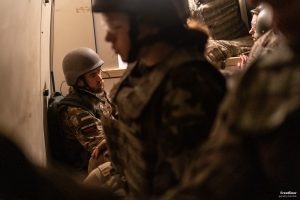
Minus! Minus! Minus! Plus!
One o’clock in the morning. The piercing whistle of the loudspeaker (a distorted version of Beethoven’s sonata Für Elise)… The trainees get up hurriedly, and, in a matter of minutes, assemble in the yard, dressed in body armor, helmets and protective glasses. The objective: to exercise placing tourniquets in order to stop blood flow. Benchmark: 30 seconds. If the tourniquet is not applied to the wounded individual within that time, the loss of blood during an actual injury can lead to death.
Booming music, loud cries and insistent knocking on doors… These are calculated measures to destabilize the cadets and plunge them into the reality of combat.
Night drill
[embedyt] https://www.youtube.com/watch?v=BWIS5XmGP-U[/embedyt]
As the cadets assemble, the instructor shouts:
“Nine minutes to get ready!!!… Game over! Way too long! We haven’t even gone anywhere. And that’s just to get ready! Hmmm, more about that later. Now everyone get the tourniquets out!”
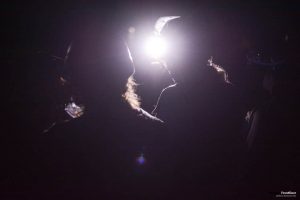
One hour of high-intensity night training begins.
Push-ups…
On the count of one, down you go; on two - up you go!
The instructor assesses the quality of the tourniquets: “Minus! Minus! Minus! Plus!”
More strenuous exercises - running and body weight maneuvers such as push-ups - all in full body armour. And, then again, applying tourniquets. Again and again. Amid flashing lights and the harsh sounds of the loudspeaker.
Night training in applying tourniquets
[embedyt] https://www.youtube.com/watch?v=VHxeAf4xOTI[/embedyt]
Tonight, there were more “minuses” than “pluses”.
The Instructors
Also of varied backgrounds are the instructors. Apart from sharing a common worldview, they all have some practical experience of field medicine. Ivan, call sign “Vano”, finished medical studies, and before the war ran his own business. Volodia, call sign “Yizhak”(Hedgehog) is a bioecologist who used to work as a taxidermist in a museum of natural history. Kyrylo, call sign “Dobry” (Good-hearted) is a trained psychologist.
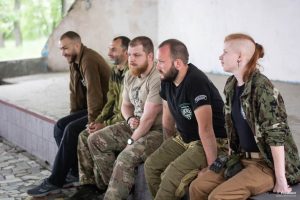
Artem, call sigh “Sobol”, almost completed medical school. Artem dropped everything when the war broke out, but says that he picked up most of his skills “in the field”. He has been training cadets for four years.
“After people complete the training course, they become more focused and more disciplined. Some say: ‘I’ve never worked out so much, but now I’m going to sign up for a gym membership!’ Some have defects that they manage to mend and forget. For example, a person knows he’s not punctual; another realizes he doesn’t know everything. People change for the better. There’s always a positive end to the training, and even those who don’t receive a certificate know that they’ve lived a new experience.”
The instructors follow modifications to civil and military protocols for administering medical care. All changes are immediately introduced into the training program.
Although the instructors’ favourite subject is tactical medicine, members of the Dnipro branch of Hospitaliery also train civilians.
“It’s a fantastic project! This is the only municipal enterprise in Ukraine that trains civilians to administer first aid. We work according to international protocols; we’re all certified, and there’s a lot to do! We work with many public entities: teachers, tram and trolleybus drivers, city park workers, subway employees, staff from the Pivdenny Construction Bureau, a major business, a pillar of the Ukrainian corporate community - they’ve all attended our training camps.” comments “Sobol”.
A particular challenge is training real-life physicians for emergency situations… like the declaration of a state of war.
“They’re all excellent specialists. They’re thoroughly familiar with civil medicine but need additional, specialized training. We once had a threat of invasion, and this hasn’t disappeared. So, you arrive, and there’s a surgeon with 30 years of experience…yet after the end of the exercise he approaches you, shakes your hand, and says: ‘Thank you! That was really interesting, I didn’t know any of this’… well, this raises the level of the whole operation!” underlines “Sobol”.
Get up and walk!
Mornings begin with warm-ups and running. Then, assembly, during which a minute of silence for the fallen defenders of Ukraine.
Trainees view a video about the work of Hospitaliery, as well as shocking photographs of wounds, burns and other combat injuries. Paramedics must approach these issues calmly.
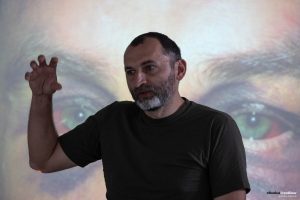
Demanding physical exercises are interspersed with lectures. The difficulty increases with each day - from the application of tourniquets to intravenous drips and drug titration required in certain injuries. Trainees alternate between injections and catheters, and learn to place nasopharyngeal airway devices, which ensure oxygenation and ventilation.
One of the most complex maneuvers is performing tracheal intubation - making an incision in the patient’s neck in order to gain direct access to the respiratory airways. Trainees learn to execute this maneuver by practicing on porcine larynx and animal skin.
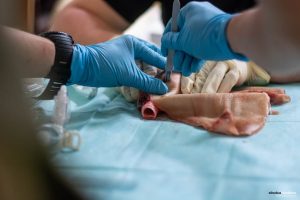
They dig trenches, learn how to use walkie-talkies, how to crawl, and how to pull wounded patients from the most unusual places.
Demining specialist “Bas” is responsible for organizing smokescreens, behind which paramedics take cover and hide from enemy snipers.
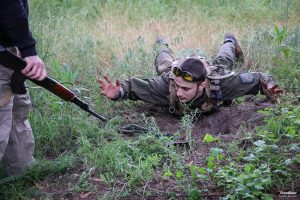
The first mission fails; the trainees, labeled as 300 (‘wounded’ in military jargon-Ed) become 200 (‘KIA’, ibid). During the feedback session, the instructors tell the trainees stories of wounded warriors. All the narratives are taken from real situations in the war zone, and behind each story stands a real human being.
“Yeah, I’m ‘slightly wounded…’” says paramedic “Dream” casually, who plays the part of a “wounded” soldier.
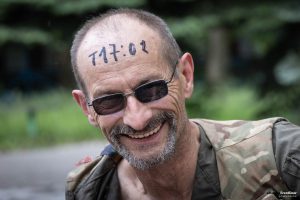
He displays the wounds that are glued onto his knee and one of his fingers. Behind the fake “bloody rags”, it is obvious that “Dream’s” finger is indeed missing. In the simulated training, he reproduces the wound that he sustained near the city of Mariinka, Donetsk Oblast. He inhales deeply on his cigarette and leans against a tree, awaiting the arrival of the trainees who are supposed to “save” him.
“Yizhak” explains that sometimes during trainings the instructors attempt to break the trainees psychologically.
“Well, you know, some of the trainees are instructors over there, in other organizations; you respect them only because they’ve agreed to learn. I mean, they’ve taken this step, but not completely. Because during the first days, when we lecture them… and then tell them that their tourniquets = zero, teamwork = zero, knowledge = not much, effectiveness = zero. If a trainee makes a wrong decision and the wounded soldier dies, it can lead to the end of his group and it can endanger other groups working nearby! So, what use is it giving him a certificate?!”
Tears are often shed; emotions rise… The instructors recall that a fighter from Ukraine’s Special Operations Forces began weep ing. “Yizhak” continues:
“He lay down on the road and said: ‘I just can’t take itanymore!’ He wasn’t hurt; it was psychological! He had already taken part in combat; he saw what happens in war; he saw his friends fall on the battlefield, and he saw how paramedics worked in the field, but he wasn’t ready to play their role. But, during the training, he began to understand the price of a medical error. He became hysterical… but he took himself in hand and next day, he went back to work.”
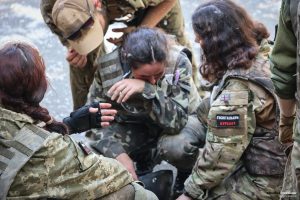
“Sobol” knows that emergency medicine requires a few years of hard work and lots of experience and that emergency doctors think they’ve seen it all. But no, not here… a vehicle arrives with a dead soldier and they freeze, lean against the wall or faint… They’re unable to continue working in the field. “Sobol” turns to the trainees and says:
“All of you, look… when war broke out, some of the guys were social climbers; they were on a pedestal; others worked quietly in the shadows. But here, this “quiet” guy works normally! And the guys who were, so to speak, on a pedestal… well, they got off their pedestal and started working normally too! Today, the conditions were the same for everyone, and they all performed really well! At the end of the training, these guys won’t even want to get back on their pedestal again. They understand their strengths and weaknesses; they know that they’re like everyone else here. We use the carrot and stick method. Some of them ‘killed’ people in tactical practice by simply confusing dosages, etc. They understand that they don’t know everything. The same goes for physical exercises…”
It’s particularly complicated to work with professional doctors, as they perceive training from a medical point of view. Despite years of experience in hospitals, they’re absolutely lost “in the field”.
Advanced training for paramedics
[embedyt] https://www.youtube.com/watch?v=meXpXeIn3Bg[/embedyt]
Hospitaliery cadets train and learn continuously. The organization has an advanced training course for active paramedics, as skills must be constantly refined and improved.
“Get up and walk!”
say the Hospitaliery, in reference to the biblical story of Lazarus and Jesus, but also to recall the paramedic-chaplain with the call sign “Lazar”, who was saved by the group.
Cooler than a Hollywood film
Several strict “taboos” are imposed during the training week: no alcohol, no sex, and no talk of politics or religion. The “punishment” for breaking these taboos: a round of physical exercises.
The same method is used to build up collective responsibility and teamwork. As such, if a trainee is late, the others wait for him/her by performing the plank exercise. Pavlivna, the Hospitaliery cook, puffs calmly on her cigarette as she contemplating the sweating trainees.
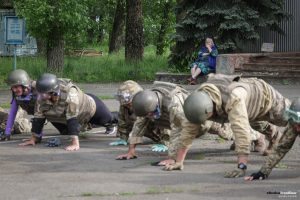
Cats come running at the call of “Covid” and “Fignya” (Crappy). Behind the fence, the Hospitaliery dog “Deputat” barks loudly. During the training sessions, he is chained to a fence, but is allowed to run freely around the base and patrol when no cadets are around.

The training program never changes, irrespective of weather conditions. “”Yizhak” remembers:
“We had a training session in March, the year before last. There was a lot of snow, and it was -3C. The trainees did push-ups and crawling exercises in the snow. But then, the snow turned to ice. They broke the ice with their elbows to be able to cling to something as they crawled forward. Then, everything melted… but we had a night drill. It was wet outside; some trainees ran out in slippers, into the snow, into the icy mush. But, they carried out all the orders. They were very motivated. What the hell! It’s amazing how people change! You arrive and look at them- they’re not the same people! You leave here, and they’re already part of the family!”
Each training session gets a new name. This one is called ‘Random Task Force Operation’; the previous one was ‘No Promises, No Excuses’. After the trainings, participants create group chats on social media, and sometimes this dialogue lasts for years.
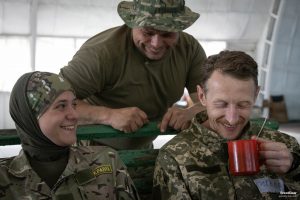
“Yizhak” explains that the Hospitaliery communicate as a family. You may find yourself in some town or city; you call and meet up… spend time together and even find a place to stay overnight.
In the evening, after the final exam, there is a good-bye party with shashlyk and film viewing. The next morning, the “moment of truth” - the certificates are given to trainees that have successfully passed the exam. The instructors drag it out to the last possible minute, reminding that not everyone will receive certificates. A few of the cadets are obviously worried as the instructors tear up the superfluous documents. However, lo and behold, all the newly trained cadets receive their certificates.
The last step is an interview with all the newly-certified cadets who wish to join a battalion and sign up for active service. Of the seventeen cadets, sixteen are ready for immediate deployment as Hospitaliery paramedics. Cadet Arsen, call sign “Orest”, shares his impressions:
“I’m amazed. The instructors are great, because they know how to get into our heads and force us to really live our role as paramedics. That requires a deep knowledge of human nature. You know, when we watch a Hollywood film, 95% of the time we know what’s going to happen in the end. But, there’s the 5% that may surprise us! In this way, the courses are fantastic, because you don’t know what to expect, even if you think you know. We’re really grateful to the organizers. Just great!”
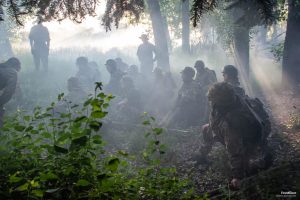
Arsen works as a mountain guide so he is quite familiar with specific high-risk injuries. He admits that during the training sessions, there were physically demanding incidents and moments of doubt:
“It was very difficult at night, when you’re on the wet ground, and you think… ‘Do I need all this; will I make it through physically?’
Well, special thanks to the organizers, because when they poke you and challenge your motivation, very decently at that, they don’t ask you direct questions; they don’t demand answers from you. They just talk to you so that afterwards, you start an internal dialogue with yourself. Do I really need this? Am I ready to put myself in such situations? Am I ready to take on responsibility? But, nobody needs your answers. They’re important to you, and only you. Yes, it was difficult, but very informative. My thank to everyone!”

Cynologist Olena, call sign “Karma”, on the other hand, expected the course to be more difficult, both emotionally and physically.
“However, each one of us took away something important. We saw how our minds worked in critical situations, how we reacted, how to work with the people around us. We analyzed our roles in each situation, as this can happen everywhere and anywhere, not only in war. Each one of us picked up something valuable from the course. Honestly speaking, apart from the cadets who are ready join a battalion, who’ll be working on the frontlines, I hope to God that no one else will need to use the knowledge and skills we’ve gained here!”
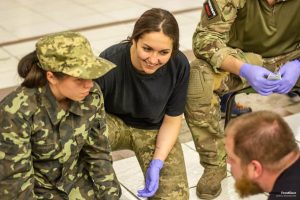
“Vuzlyk” looks up and comments on her experience.
“It’s very difficult to understand what to expect, because we constantly face “little surprises”. It’s actually more than testing yourself. I thought that I wouldn’t be able to do it, that it would be more difficult. I’m pleasantly surprised with myself!”
“Vuzlyk” used to work as a nurse and volunteer with the Red Cross. However, working with the Hospitaliery instructors appeals to her:
“I’m really impressed with the way the instructors go about their work. I don’t know what it’s like elsewhere, but I was able to catch everything they showed us very quickly and compactly. I really liked the way we interacted. They put you in very stressful situations, but they do it… I dunno, with love and respect. The atmosphere wasn’t oppressive; there was no excessive pressure; they didn’t look down on us. Attitude means everything, and I’m very satisfied.”
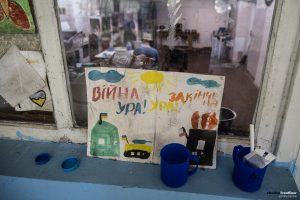
When asked who should join the Hospitaliery Battalion, “Vuzlyk” replies: “Let’s be honest… we live in Ukraine. It’s a must for all of us!”
Video compilation. Sequences of the Hospitaliery training program.
[embedyt] https://www.youtube.com/watch?v=F3skjlJpXoo[/embedyt]
Donbas Frontliner media is grateful to the Hospitaliery Battalion for their hospitality and paramedical training for our team of reporters!
Support #Frontliner on Patreon: https://www.patreon.com/donbasfrontliner
The material was prepared with the support of the European Union and the International Renaissance Foundation within the framework of the joint initiative EU4USociety. The material reflects the position of the authors and does not necessarily reflect the position of the International Renaissance Foundation and the European Union.

